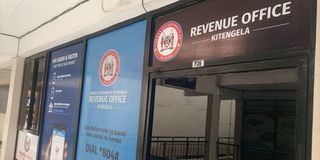Kajiado County goes cashless in revenue collection

Revenue offices in Kitengela town, Kajiado County in this picture taken on April 7, 2024.
Kajiado County government has fully adopted a cashless revenue collection system in a bid to triple its Own Source Revenue (OSR) and seal corruption loopholes.
The ambitious move aims to eliminate cash transactions in revenue collection across all departments, reduce opportunities for embezzlement and promote accountability.
All business permits under the unified business permits are now applied for online and payment is made through banks and M-Pesa platforms.
All liquor licences, Public Service Vehicle monthly payments and stall rent payments have been fully digitised.
The Department of Lands, which remains a major artery for the devolved unit OSR, has been fully integrated into the cashless platform. Registration of plots, approval of building plans, payment of land rates and plot rent are done by individual applicants online, eliminating cartels that are said to have minted millions of shillings in dubious deals.
In the past two months, long queues at sub-county revenue and licensing offices are said to have reduced significantly.
Mr John Munge, a trader from Kitengela, told the Nation that the transition was overdue to protect taxpayers from cartels.
"The transition has dealt a blow to a cartel that has held the revenue department captive for years, pocketing the revenue. We now want better services," said Mr Munge.
Kajiado County Director of Revenue, Vera Moraa, told the Nation on Saturday that the full implementation of cashless revenue collection will help the county achieve the Sh1.2 billion OSR target in the next financial year.
"We have now fully adopted cashless revenue collection to seal corruption loopholes. Our revenue payers should not be duped into paying for any county service in cash. Payment for services has now become a one-stop online shop," said Ms Moraa.
She warned business owners who are found operating with fake trading licences, especially in satellite towns such as Ngong, Ong'ata Rongai, Kiserian, Kitengela, Isinya and Kajiado towns.
"Our county multi-agency team has embarked on an exercise to verify all business licences. It will no longer be business as usual for those who may be operating with fake licences," she added.
However, the Nation has learnt that some of the unscrupulous revenue officers who used to run the revenue theft syndicate are reluctant to embrace the change.
In 2022, Governor Joseph Lenku restructured the revenue department to boost its revenue collection potential. Among the many measures taken to plug corruption loopholes is the use of digital platforms in revenue collection.
The county's Revenue Department collected Sh527 million in the 2021/2022 Financial Year, which increased by 66 per cent to Sh875 million in the 2022/2023 Financial Year, which ended on 30 June 2023.
Since 2022, the Revenue Department has been using sub-counties as platforms for revenue collection as opposed to the previous use of various streams managed at the county level.





